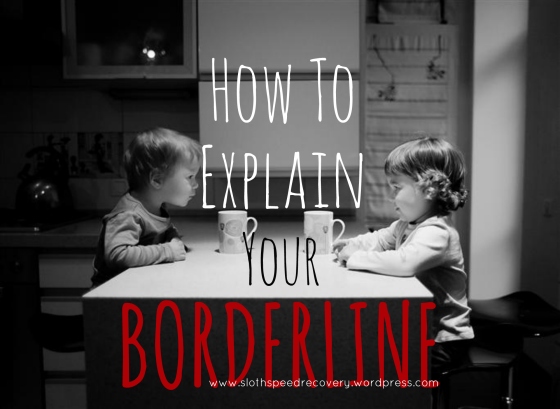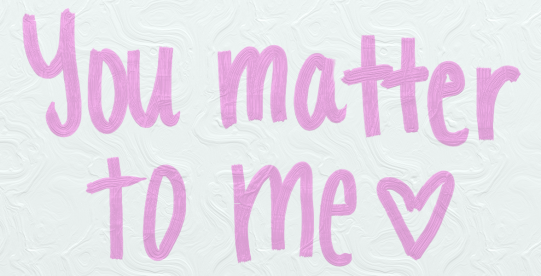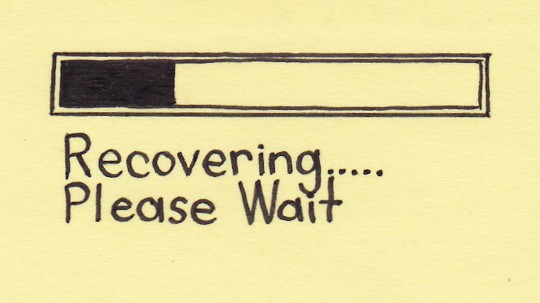
Borderline Personality Disorder is a mental illness that will never be easy to explain. It’s got curves and edges that aren’t easily described, nor simply comprehensed. We often hear of the people who think mental illness is a joke, that those diagnosed with one are lazy, etc, and sometimes, we refuse to discuss it because of that fear of stigma. Being judged for having a mental illness is never a walk in the park, it can be very complicated. When it comes to explaining BPD, multiply that difficulty by a thousand and give the situation acid.
BPD is a complex disorder, and no two individuals diagnosed are the same. We may share similar behaviours and thoughts, but we will never be identical. That’s why it isn’t fair to base our condition on someone else, or in this case, have them base our disorder one someone else.
If they’ve never heard or been exposed to Borderline, it clears up that hurdle, but you may run into people who believe the stigma. But, with the right words and explanation, even they can grow to understand and appreciate the hardships of BPD individuals, mainly yourself.

How do you tell someone new?
You want to start the discussion with a warning. Assuming that this person is now vital in your everyday life, you want to assure that what you are about to tell them is very complicated, but that you care about them, and want them on board. The other party must be in a relatively positive mood.
If they are not ready or in the right mood (angry, upset, etc), DO NOT START THE CONVERSATION.
I have a disorder. When you are sure they are well, be straight forward and honest. State that you have a disorder and that it is a mental illness. State approximately when you found out, and how you felt when you heard the news.
Borderline is… Explain the disorder and your experience living with it.

But why am I telling you this? You are telling this individual because they are getting personally involved in your life and they matter to you. You want them to understand your conditions and be a supportive partner in your recovery and your battles.
Mood swings. There must be a reason that you are telling this individual and it must be due to their involvement in your life. It is important to state that you experience mood swings and periods of instability, and that they can be triggered by their behaviour or statements. Assure that it is not their fault, though you struggle with emotion control.

My extra behaviours. What are your symptoms? Do you dissociate more than react? Do you threaten and manipulate instead of taking a breather. Do you self harm when you are upset? Do you have black and white thinking, or are you in a gray area? Do you struggle with suicidal thoughts? Do you have any other mental illnesses that tie in with BPD (eating disorders, bipolar, depression, anxiety, paranoia, etc)? Clarify what you would need if you fall on a maladaptive coping strategy.
The Good. Explain the benefits that this disorder may bring you. We feel emotions so deeply, thus we are passionate people. We love with all of our hearts, we chase our dreams (and continue even when we fail) and we understand global hardships because we connect easily with others’ struggles.

I can recover. You must assure anyone you confront about this condition that you can recover. If you are not in the recovery stages, state that it is possible but you just aren’t there yet. If you are in recovery, state the things that you are doing to continuously get better (groups, therapy, every day activities, mood management, etc). Guarantee them that it will take a lot of time and an enormous amount of perseverance. If you are comfortable with stating it, and are underage, you can mention that the disorder may die out for some individuals because it was mainly brought on by puberty and adolescent emotions.
Last statements. Borderline is never an easy disorder to live with. It can be beautiful and harshly ugly. One day, we may love them to the end of the Earth, they may be disowned the next, but it doesn’t mean that we don’t love them. Our actions do not speak for us, especially during an episode. Ask that if the relationship becomes rocky, that they take the time to comprehend that you may have had an episode or are experiencing struggles, or may be reliving trauma.
Tips:
- Be vulnerable.
- Provide detail, but not enough in the case that they are not understanding and become angry.
- Only confide in them if you are sure in advance that they will not use it against you.

Example:
I have a disorder. It’s called Borderline Personality Disorder, and it affects me every single day of my life. It is a mental illness that I got diagnosed with 4 years ago, when I was only 14.
Borderline is… a disorder focused on behaviours and coping mechanisms, as well as uncontrollable emotions. It primarily births from abandonment during childhood, along with repeated trauma, and enforces bad coping behaviours later on. It is very hard to maintain stable relationships, and we can become frantic and over emotional. We struggle with poor self esteem and body image, and practice maladaptive coping strategies. It is very common for us to threaten suicide and practice non-fatal suicidal behaviours.
But why am I telling you this? You need to know because I value our relationship, and I want you to be aware of my Mood swings. They are present when I experience extreme emotions and don’t know how to cope with them. I will need your support and understanding in times of need or episode.
My extra behaviours include self harm, repetitive suicidal tendencies and some black and white thinking. At times, my other disorders shine, like my anorexia and my PTSD. Though I struggle through this, it is important that I know you are there for me, that you love me, and be reminded that I can get through it.
The good of having been diagnosed is that I now understand myself a little bit better, and I know why I react in the ways that I do. I’ve learned that I’m quite passionate in art and music, and won’t let anybody get in my way.
I can recover and have been in recovery for 2 years now. It is a slow process but I attend therapy weekly, even when I don’t want to. I use rubber bands instead of razor blades when my emotions overwhelm me, and I attend a Dialectic Behavioural Therapy group twice a month.
My last statements to you are that I struggle on a daily basis, and I may be unkind, but my love and care for you is real and more profound than my mood swings. I want you apart of my recovery and support system because you matter in my life, and inspire me to get better.

It will not be an easy topic to confront with anyone, but by discussing it and being raw with someone, it can truly open their eyes to your life and struggles. Being honest is the only way to be acknowledged and earning the support of yet another important patron in your recovery.

Fantastic post! I love the new site design to 🙂
LikeLiked by 1 person
Thank you so much! I hope it helps people out!
LikeLiked by 1 person